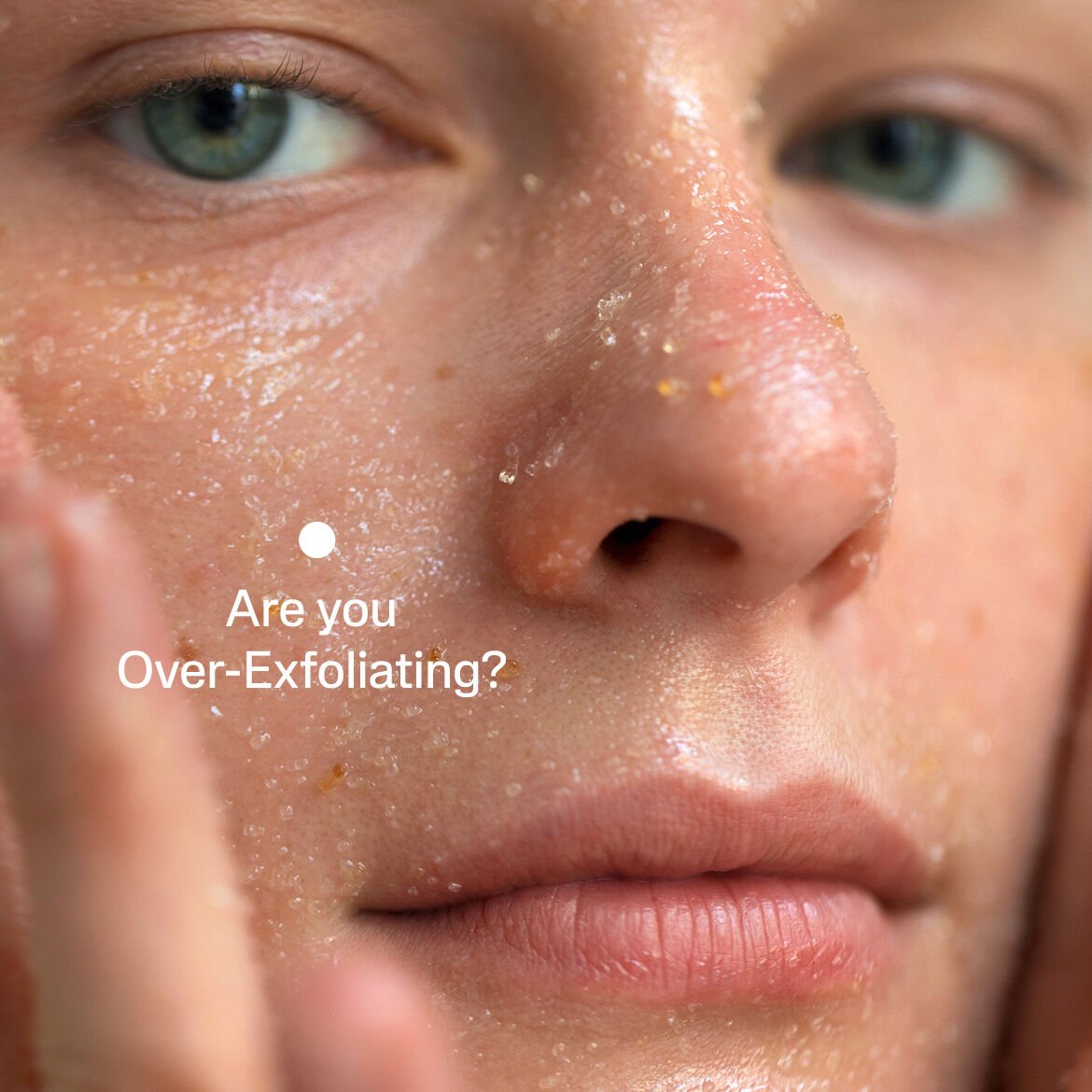ARE YOU OVER-EXFOLIATING?
You’ve probably heard of exfoliating by now or have tried exfoliating your skin in the past, but do you know what actually happens to your skin when you do?
Your skin is constantly shedding skin cells to make room for newer, smoother ones. So when you use your own physical or chemical exfoliants, you’re simply speeding up that process on the top layer of your skin to remove those “dead” or dull skin cells.

Why Exfoliation Is Important
As we age, our body starts to pump the breaks, slowing down the skin renewal process. Sometimes, those skin cells can get trapped and build up on the skin’s surface. That can lead to:
- Clogged pores
- Dark spots
- Rough skin
- Dullness
- Dryness
- Pronounced wrinkles
So exfoliation can be good! It helps unclog pores, prevents acne, boosts cell turnover and allows your skincare products to penetrate deeper. But sometimes, exfoliating can be too much.
Without the professional guidance of a dermatologist, it’s very easy for you to over-exfoliate and aggravate your sensitive skin, which can leave it in a worse condition than when you started. Here are some great tips to help you take the best care of your skin when you exfoliate.
Don’t Buy Into Every Routine
You may have seen words like “resurfacing” or “purifying” on your skincare products, which are important words to look for, because they indicate exfoliating ingredients in the formula. But not all exfoliating ingredients are right for all skin types.
Take a closer look at those formulas and you’ll see that they’re not all designed for daily use –– let alone twice a day! Especially for sensitive skin.
Get to Know Your Ingredients
So what are the most common chemical ingredients used to exfoliate sensitive skin?
- AHAs (glycolic, lactic, mandelic, and tartaric acid)
- BHAs (salicylic acid)
- PHAs (gluconolactone, lactobionic acid, and galactose)
- Enzymes (sourced from Pineapple and Papaya)
Chemical exfoliants like AHAs, BHAs, and PHAs do a great job of removing dirt and impurities from your face, unclogging pores, and preventing future breakouts.
If you have sensitive skin, look for PHAs in particular, which tend to be the most gentle and irritate skin the least.
As for all those “acids,” there’s nothing wrong with using them in your routine, but it’s important to look at the percentages too.
Let’s take salicylic acid, for example. Some formulas range anywhere from 0.5% to 5.0% salicylic acid; however, if you have sensitive skin, you want to shoot for formulas in the 0.5-2.0% range so you don’t irritate your skin.
How Do You Know if You’re Over-Exfoliating?
Exfoliating can be so beneficial to your routine! But how do you know if you’re overdoing it? Look for these signs:
- Irritation, like burning or stinging
- Inflammation, like red patches or swelling
- Breakouts or clusters of small pimples
- Increased dryness, like peeling or flaking
- Tight, waxy-looking skin
“According to our dermatologists, you should only
exfoliate a maximum of 1-2 times per week.”
Stick with exfoliating once a week –– twice if your sensitive skin can tolerate it, but no more.
Another skin tip: Exfoliating before bedtime can be beneficial so that your skin has more time to recover overnight –– and, more importantly, avoid sun exposure afterward.
Never Skip Your SPF
We all know the benefits of using a daily SPF, and it’s an essential part of protecting your sensitive skin from damaging UV rays when you use exfoliants. Especially since sun exposure can cause or increase skin sensitivity after exfoliating.
So You’ve Over-Exfoliated. Now What?
It’s okay, it happens! But there are solutions.
- Stop exfoliating ASAP! (That’s the easiest part)
- Switch to a simplified routine that’s specially formulated for sensitive skin, like our hydrating Gentle Skin Cleanser and our Daily Facial Oil-Free Moisturizer SPF 35.
- If your skin is really irritated, spot treat with our Healing Ointment to protect and help heal your skin fast.
Don’t Worry! Better Skin Days Are Ahead.
Your skin actually has a superpower: it can rejuvenate! Depending on your age, your skin cells renew on average, every 24 to 80 days. So, you’ll want to keep using products that help that process along.
(Do keep in mind that it can take up to 12 weeks to see visible results from any product because of the time it takes for skin cells to turnover.)
We know that caring for sensitive skin can feel like extra work, but our experts are always here to help. Trust us, once you fully understand your sensitive skin, it’s better skin days to come.






.png?sw=450&sh=450&sm=fit&q=85)

.png?sw=450&sh=450&sm=fit&q=85)










.png?sw=450&sh=450&sm=fit&q=85)








